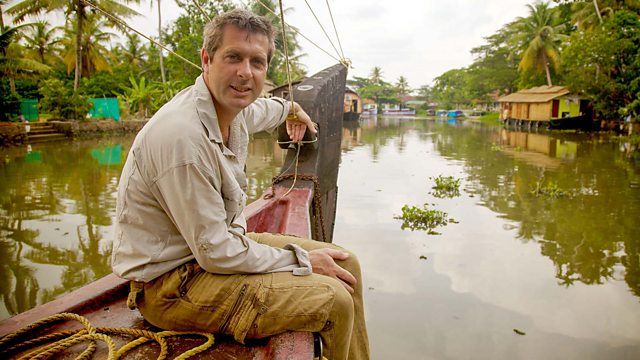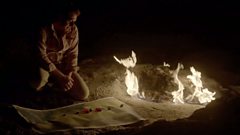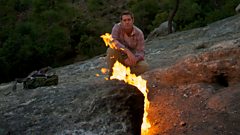
Eurasia
Professor Iain Stewart shows that where the south of Eurasia is today there was once an ocean and how, in 250 million years, all of the continents will collide together
Two hundred million years ago the continent we know as Eurasia - the vast swathe of land that extends from Europe in the west to Asia in the east - didn't exist.
To reveal Eurasia's origins, Professor Iain Stewart climbs up to the 'eternal flames' of Mount Chimera in southern Turkey, blazing natural gas that seeps out of the rock. Formed on the seafloor, it shows that where the south of Eurasia is today, there was once a 90-million-square-kilometre ocean known as the Tethys. It is the destruction of the Tethys Ocean that holds the key to Eurasia's formation.
In the backwaters of Kerala in southern India, he finds evidence of how that happened, in the most unlikely of places: the bones of the local fishermen's catch. The freshwater fish called karimeen shares anatomical features with another group of fish that live in Madagascar, evidence that India and Madagascar were joined. India was once 4,000 kilometres south of its current position on the other side of the Tethys.
As it moved north, the ocean in front of it closed. And as it collided with the rest of Eurasia the impact built the Himalayas, the greatest mountain range on Earth. Professor Stewart reveals how the mountains aren't simply pieces of the land pushed upwards. In fact the rock that forms them was once the floor of the Tethys Ocean.
As Eurasia assembled, Arabia, Greece and Italy too moved north, completing the continent we know today and creating a mountain chain that spans the continent. And it was in the shadow of these mountains that the continent's first civilisations rose.
But the formation of Eurasia is just the beginning, because the process that formed it is still active today. On the island of Stromboli, Italy's most continually active volcano, the spectacular eruptions show that the ocean floor is being pulled beneath Eurasia. It is this process that closed the Tethys, and today is closing the Mediterranean, revealing Eurasia's future. 250 million years in the future all of the continents will collide together once more, forming a new Pangea, with Eurasia at its heart.
Last on
More episodes
Previous
Next
You are at the last episode
Clips
-
![]()
The greatest mountain range on Earth
Duration: 03:18
-
![]()
The eternal flames
Duration: 05:06
-
![]()
Fishing for karimeen
Duration: 02:59
Music Played
-
![]()
Keoki
Pass It On
Credits
| Role | Contributor |
|---|---|
| Presenter | Iain Stewart |
| Series Producer | Zoe Heron |
| Executive Producer | Jonathan Renouf |
| Producer | Stephen Cooter |
| Director | Stephen Cooter |
Broadcasts
- Sun 30 Jun 2013 21:00
- Mon 1 Jul 2013 23:20大象传媒 Two except Northern Ireland
- Tue 2 Jul 2013 00:20大象传媒 Two Northern Ireland
- Thu 17 Jul 2014 22:00
- Fri 18 Jul 2014 01:30
- Tue 10 Mar 2015 00:00
- Mon 27 Jun 2016 23:00
- Mon 4 Jul 2016 02:30
- Thu 18 May 2017 16:15
- Tue 24 Jul 2018 00:15
- Thu 28 Feb 2019 15:15
- Sat 12 Sep 2020 09:00大象传媒 Two except Scotland
- Fri 16 Jul 2021 14:15大象传媒 Two except Scotland
- Thu 28 Jul 2022 19:30
- Fri 29 Jul 2022 01:30
大象传媒 Earth
Discover and share amazing animal facts, photos and news





